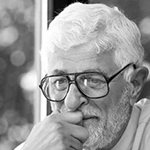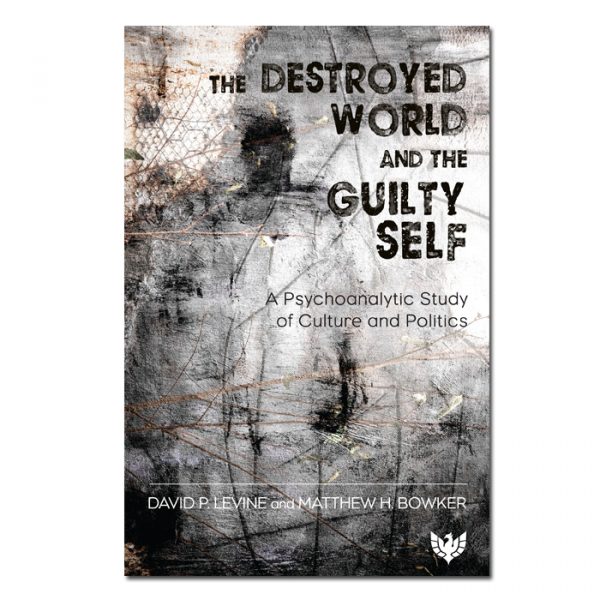About the author
 Vamık Volkan, MD, DFLAPA, received his medical education at the School of Medicine, University of Ankara, Turkey. He is an emeritus professor of psychiatry at the University of Virginia, Charlottesville and an emeritus training and supervising analyst at the Washington Psychoanalytic Institute, Washington, DC. In 1987, Dr Volkan established the Center for the Study of Mind and Human Interaction (CSMHI) at the School of Medicine, University of Virginia. CSMHI applied a growing theoretical and field-proven base of knowledge to issues such as ethnic tension, racism, large-group identity, terrorism, societal trauma, immigration, mourning, transgenerational transmissions, leader–follower relationships, and other aspects of national and international conflict. A year after his 2002 retirement, Dr Volkan became the Senior Erik Erikson Scholar at the Erikson Institute of the Austen Riggs Center, Stockbridge, Massachusetts and he spent three to six months there each year for ten years.
Vamık Volkan, MD, DFLAPA, received his medical education at the School of Medicine, University of Ankara, Turkey. He is an emeritus professor of psychiatry at the University of Virginia, Charlottesville and an emeritus training and supervising analyst at the Washington Psychoanalytic Institute, Washington, DC. In 1987, Dr Volkan established the Center for the Study of Mind and Human Interaction (CSMHI) at the School of Medicine, University of Virginia. CSMHI applied a growing theoretical and field-proven base of knowledge to issues such as ethnic tension, racism, large-group identity, terrorism, societal trauma, immigration, mourning, transgenerational transmissions, leader–follower relationships, and other aspects of national and international conflict. A year after his 2002 retirement, Dr Volkan became the Senior Erik Erikson Scholar at the Erikson Institute of the Austen Riggs Center, Stockbridge, Massachusetts and he spent three to six months there each year for ten years.
In 2006, he was Fulbright/Sigmund Freud-Privatstiftung Visiting Scholar of Psychoanalysis in Vienna, Austria. Dr Volkan holds honorary doctorate degrees from Kuopio University (now called the University of Eastern Finland), Finland; from Ankara University, Turkey; and the Eastern European Psychoanalytic Institute, Russia. He was a former president of the Turkish-American Neuropsychiatric Society, the International Society of Political Psychology, the Virginia Psychoanalytic Society, and the American College of Psychoanalysts. Among many the awards he received are the Nevitt Sanford Award, Elise M. Hayman Award, L. Bryce Boyer Award, Margaret Mahler Literature Prize, Hans H. Strupp Award, the American College of Psychoanalysts’ Distinguished Officer Award for 2014, and the Mary S. Sigourney Award for 2015. He received the Sigmund Freud Award given by the city of Vienna, Austria in collaboration with the World Council of Psychotherapy. He also was honoured on several occasions by being nominated for the Nobel Peace Prize with letters of support from twenty-seven countries. Dr Volkan is the author, co-author, editor, or co-editor of more than fifty psychoanalytic and psychopolitical books, including Enemies on the Couch: A Psychopolitical Journey through War and Peace. Currently Dr Volkan is the president emeritus of the International Dialogue Initiative (IDI), which he established in 2007. He continues to lecture nationally and internationally.
Vamık Volkan won the 2021 Gradiva Award for his book Large-Group Psychology: Racism, Societal Divisions, Narcissistic Leaders and Who We Are Now.
To view all our titles from Vamık Volkan, click here.




 Vamık Volkan, MD, DFLAPA, received his medical education at the School of Medicine, University of Ankara, Turkey. He is an emeritus professor of psychiatry at the University of Virginia, Charlottesville and an emeritus training and supervising analyst at the Washington Psychoanalytic Institute, Washington, DC. In 1987, Dr Volkan established the Center for the Study of Mind and Human Interaction (CSMHI) at the School of Medicine, University of Virginia. CSMHI applied a growing theoretical and field-proven base of knowledge to issues such as ethnic tension, racism, large-group identity, terrorism, societal trauma, immigration, mourning, transgenerational transmissions, leader–follower relationships, and other aspects of national and international conflict. A year after his 2002 retirement, Dr Volkan became the Senior Erik Erikson Scholar at the Erikson Institute of the Austen Riggs Center, Stockbridge, Massachusetts and he spent three to six months there each year for ten years.
Vamık Volkan, MD, DFLAPA, received his medical education at the School of Medicine, University of Ankara, Turkey. He is an emeritus professor of psychiatry at the University of Virginia, Charlottesville and an emeritus training and supervising analyst at the Washington Psychoanalytic Institute, Washington, DC. In 1987, Dr Volkan established the Center for the Study of Mind and Human Interaction (CSMHI) at the School of Medicine, University of Virginia. CSMHI applied a growing theoretical and field-proven base of knowledge to issues such as ethnic tension, racism, large-group identity, terrorism, societal trauma, immigration, mourning, transgenerational transmissions, leader–follower relationships, and other aspects of national and international conflict. A year after his 2002 retirement, Dr Volkan became the Senior Erik Erikson Scholar at the Erikson Institute of the Austen Riggs Center, Stockbridge, Massachusetts and he spent three to six months there each year for ten years.
Salman Akhtar, Professor of Psychiatry, Jefferson Medical College; Supervising and Training Analyst, Psychoanalytic Center of Philadelphia –
Vamık Volkan, a pioneering and prolific contributor to the psychoanalytic study of large-group psychology, offers us yet another gem here. His “Ghosts in the Human Psyche” delineates, in a methodical and step-by-step fashion, the psychoanalytic treatment of a “Muslim Armenian” in Turkey, which he supervised, on a regular basis, from his home base in the United States. Skillfully synthesizing history, politics, cultural narratives, and contemporary object relations theory, Volkan sheds light on how such interdisciplinary and comprehensive understanding of an individual deepens not only the psychoanalytic treatment but also our grasp of the human condition at large.
M. Gerard Fromm, PhD, President, International Dialogue Initiative; Distinguished Faculty, Erikson Institute, Austen Riggs Center –
In recent years, Vamık Volkan has given us a series of wonderful and all too rare gifts: breathtakingly clear, moving, and honest accounts of extended psychoanalytic treatments. This book is another gem in that sequence. But, unlike almost anyone else writing today, Volkan also shows us – again in clear and completely convincing ways – how the intimate life of one person is profoundly intertwined with the deep currents of history, and how that shows itself in the analysis. That he does this, with palpable respect, in the role of supervisor reminds us that supervision is a second look, so to speak, a perspective that might help the analytic pair grasp the larger context, often a context of large- group identity and historical trauma, sometimes for both parties. This gift to us is also a gift to the patient, his analyst, and to psychoanalysis itself.
Ilany Kogan, Training and Supervising Analyst at the Israel Psychoanalytic Society –
In this new psychoanalytic era, where the impact of historical events on the development of the personality is now recognised, Dr Vamık Volkan describes his observations on the impact of cultural elements, political movements and their mental images on the psyche of individuals. He does this through a candid and detailed description of a case study from the perspective of an analytic supervisor. The analytic journey described in the book is profound, clear, and authentic. Not only trainees but experienced psychodynamic clinicians as well will find this book a pleasurable learning experience
Val Simanowitz, MBACP Senior Accredited Counsellor and Supervisor; Ex-trainer in the May edition of ‘Therapy Today’ –
This very accessible case study is written by a Nobel prize nominated Turkish/American psychoanalyst. It illustrates his contention (and that of much of the therapeutic world today) that psychoanalytical therapists must take into account the historical, political and social background of their patients. […] This extremely readable book could be used in diversity training, as it traces the influence of group identity on the psychological state of a patient (his therapist and her supervisor) and on the trajectory of their work.
H G Perdigao, MD – 5 star Amazon review / May 2019 –
Clear presentation in easy to read language: This short book packs a lot of information and it gives a very explanation via an unusual case report how a psychoanalyst thinks and works.
David Morgan, British Journal of Psychotherapy 37,2 (2021) 327–349 –
‘This remarkable book shows in one illustration how an analysis containing an awareness of poverty and a traumatic history demonstrates how the transgenerational manifests itself in the unconscious of a single patient. … This book is an unusual study of one entire case of a patient, supervised by Vamik Volkan. It beautifully demonstrates the importance of recognizing the forces exerted on and within an individual’s unconscious. … [an] interesting and relevant book …’
Sureyya Iscan, The Psychoanalytic Quarterly Vol. 90 No. 4 (2021) –
‘Volkan clearly and honestly demonstrates how large-group identities and functioning, as well as external events, are relevant to psychoanalysis as a theory, a treatment, and an organization, and how the impact of these can contribute to determining an individual’s internal life. […] strongly recommended for psychotherapists and psychoanalysts who are interested in a close look at an analytic process that reveals the strong influence of historical and cultural events and their pervasive impact on the human psyche. This is also an especially timely book in this new era of psychoanalysis in which the external world’s influence on psychodynamics—including in such areas as gender, race, social class, ethnicity, and culture—has risen to the forefront of our thinking.’